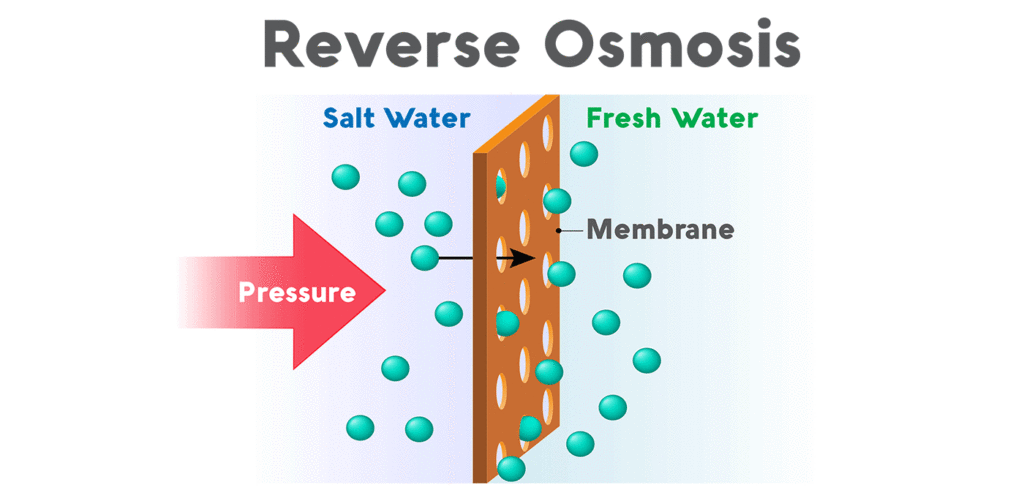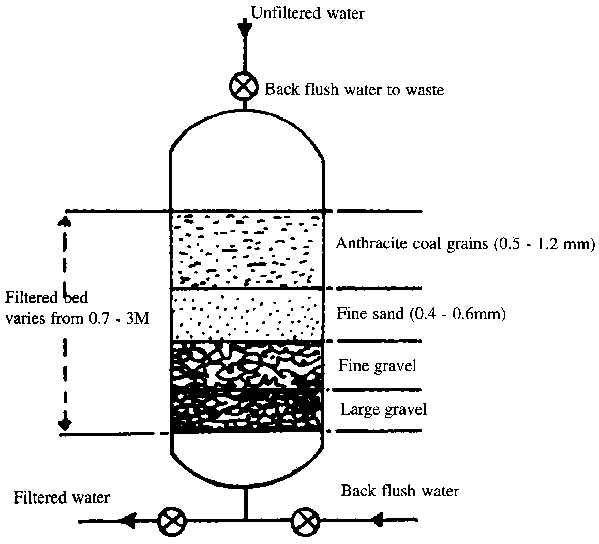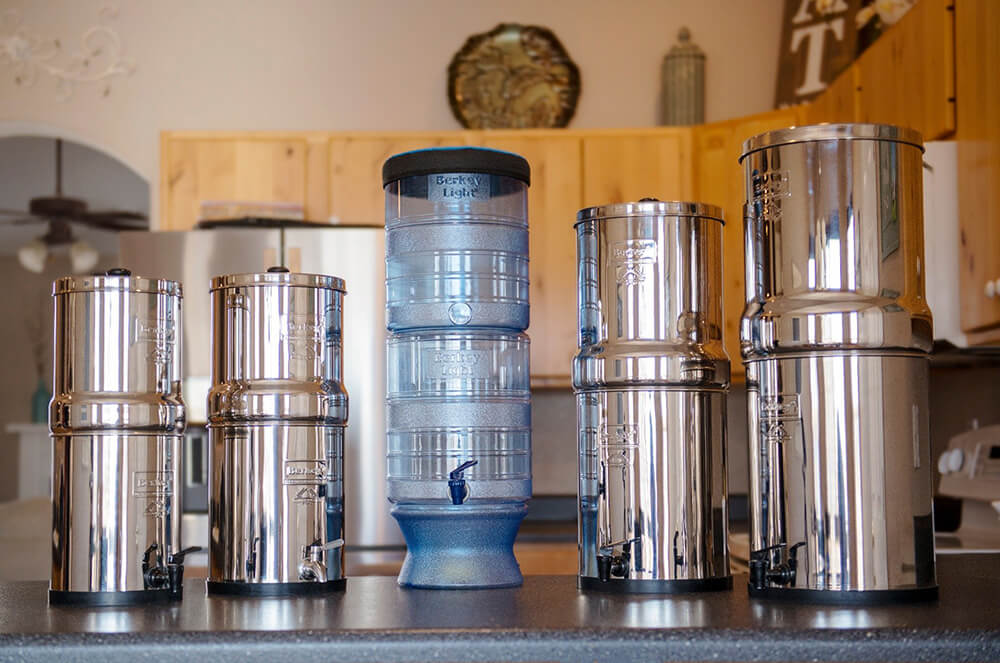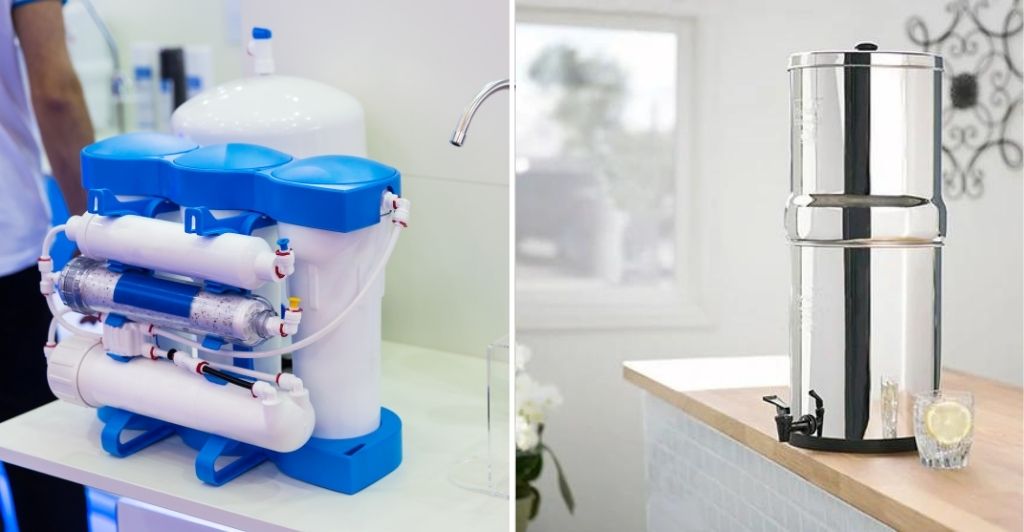Reverse Osmosis vs Berkey Filter — Which is Best?
So if you’re looking for a simple water filter that is easy to install, work without electricity, and lasts longer — then go for Berkey water filters!
But if you’re looking for a filtration system that can remove all the contaminants from water, then RO water filtration systems will be best for you.
Water is Earth’s natural resource, and it is vital for our bodies. The water’s quality has been depleting with time, and it becomes essential to free it from harmful substances to ensure that we consume clean and fresh water.
While clean water is good for your health, contaminated water can have adverse health effects, and hence, water filtration systems are used to filter all the contaminants found in water. While reverse osmosis is a common filtration method, gravity water filtration is another effective method for filtering water.
In this article, we will go through both of these filtration methods in detail, along with their uses, advantages, and disadvantages.
Let’s get started…
Reverse Osmosis Filtration Systems
To understand the process of reverse osmosis correctly, it is vital to understand the meaning of osmosis. Osmosis is our universe’s natural process that is important for the lives of everyone on the planet.
In this process, solvents pass through a membrane from a solution that has a solute in low concentration to a solution that has a solute in high concentration.

The solution that passes through this membrane during the process of osmosis is usually water. It is also vital to note that this membrane needs to be semipermeable, which means that it should allow some particles to pass through it and stop the others from passing.
The process of osmosis carries on till the solution present at both sides of the membrane gains equilibrium.
As the name suggests, reverse osmosis is entirely opposite to osmosis. In this process, a solution with a high amount of solutes is passed through a semipermeable membrane to a solution with a low amount of solutes.

In simple words, the reverse osmosis filtration process makes contaminated water pass through a semipermeable membrane that allows only clean water to pass through it and stops all the harmful chemicals and substances behind.
Advantages of a Reverse Osmosis Filter
Most people just don’t realize that having a RO system in your home can do more than simply provide safer water. But it also cleans up the taste of the water and improves its quality tenfold.
Let’s now see all the advantages of reverse osmosis filtration systems…
- RO filters can make tap water with high amounts of TDS drinkable by eliminating the extra minerals.
- RO filters use proven technology to get rid of contaminants for providing pure and clean drinking water.
- Many contaminants such as lead, aluminum, nitrate, fluoride, chlorine, heavy metals, pharmaceuticals (if you live in a populated area), and pesticides are significantly reduced with a reverse osmosis system.
- Reverse osmosis filter removes nearly 100% of the chlorine from your tap water, leaving behind fresh, clean drinking water that tastes great!
- Most reverse osmosis systems are easy to install. You hook up the water line, add the filter and put it under the sink or attach it to your faucet. Some systems might require extra plumbing work, but most do not.
Disadvantages of a Reverse Osmosis Filter
Reverse osmosis filters are a fantastic tool to have in your modern kitchen. However, they do have some pitfalls that you should be aware of before using one.
- RO filters remove chlorine, and hence, there is always a risk of bacteria growing back even after the water has been filtered.
- RO filters waste a lot of water in the process of producing clean water.
- RO filtration systems can be a little expensive, and they also require replacements and maintenance at regular intervals.
Is Reverse Osmosis Water Good for Consumption?
Reverse osmosis water filters get rid of contaminants dissolved in water. These contaminants are not visible to the naked eye, but they can be dangerous for your body.

Although RO water filters remove almost all the harmful contaminants, they also remove some components such as calcium and magnesium required by our body. However, reverse osmosis is not bad for your body as the body can get these essential minerals from food.
Moreover, as per the recommendations by the EPA, the level of TDS present in water should not be more than 500 parts/million.
Berkey Water Filter Systems
Berkey water filters use gravity to purify water. In this water filtration system, water is made to flow from a top container that contains contaminated water to a filter at the bottom that stores the purified water.
This water is allowed to flow while gravity is used as the key mechanism for purifying the water.

This process doesn’t use electricity, and they only use Ultra Filtration and activated carbon to successfully go through with the process.
The activated carbons remove pesticides, chlorine, impurities, and parasites found in water. The fiber mesh present in a gravity filter acts as a barrier for all the dust particles. The Ultra Filtration system eliminates cysts and bacteria from the water.

This way, the Berkey filter purifies the water and makes it clean for regular use and consumption.
Pros of a Gravity Filter
- Extremely affordable
- Efficiently purifies the water
- A gravity filter is portable
- Easy to install and use
- Doesn’t work on electricity
Cons of a Gravity Filter
- Doesn’t eliminate heavy metals found in water
- Not effective in making water with high TDS potable
- Has a low flow rate
- Doesn’t effectively get rid of microorganisms that cause diseases
Final Words — Reverse Osmosis vs Berkey Filter?
Reverse Osmosis and Berkey filters are two of the most popular options for filtering your drinking water. Both systems purify the water, removing contaminants and minerals that may be present in your tap water.
The main difference between RO and Berkey is how they remove the contaminants; RO filters the water through semi-permeable membranes while Berkey uses a combination of filters, including activated carbon and ion exchange resins.
If you want to know which is best, it depends on what you’re trying to filter out of your water.
For example, if you’re looking to remove heavy metals such as lead or mercury, RO is better since it removes 100% of those elements from your water. On the other hand, if you’re concerned about fluoride in your water, a Berkey filter works well for that purpose because it can remove up to 98% of fluoride from your water.
It’s also worth noting that some people prefer Berkey because it’s a “whole home” solution. You don’t need to buy multiple pitchers or RO units for different rooms; just fill up your Big Berkey with water from any faucet or sink in your home and drink it straight from the vessel.
FAQs
Are gravity filters effective?
Gravity filters are very good as they can easily purify non-potable water.
Is it safe to drink water purified by a gravity filter?
If the water supply of your home comes from the corporation or municipality, a gravity filter will do the job of purifying it for you. However, if your home’s water supply has high amounts of TDS, a gravity filter will prove to be of no use.
Do gravity filters successfully eliminate heavy metals found in tap water?
No. Gravity filters fail to remove heavy metals found in tap water. If your tap water supply contains heavy metals, you should install a reverse osmosis filtration system for best results.
Is there any filtration method better than RO filters?
A top-notch carbon filter is known to be better and more effective than a normal reverse osmosis filter, as a carbon filter also removes harmful VOCs present in water.
